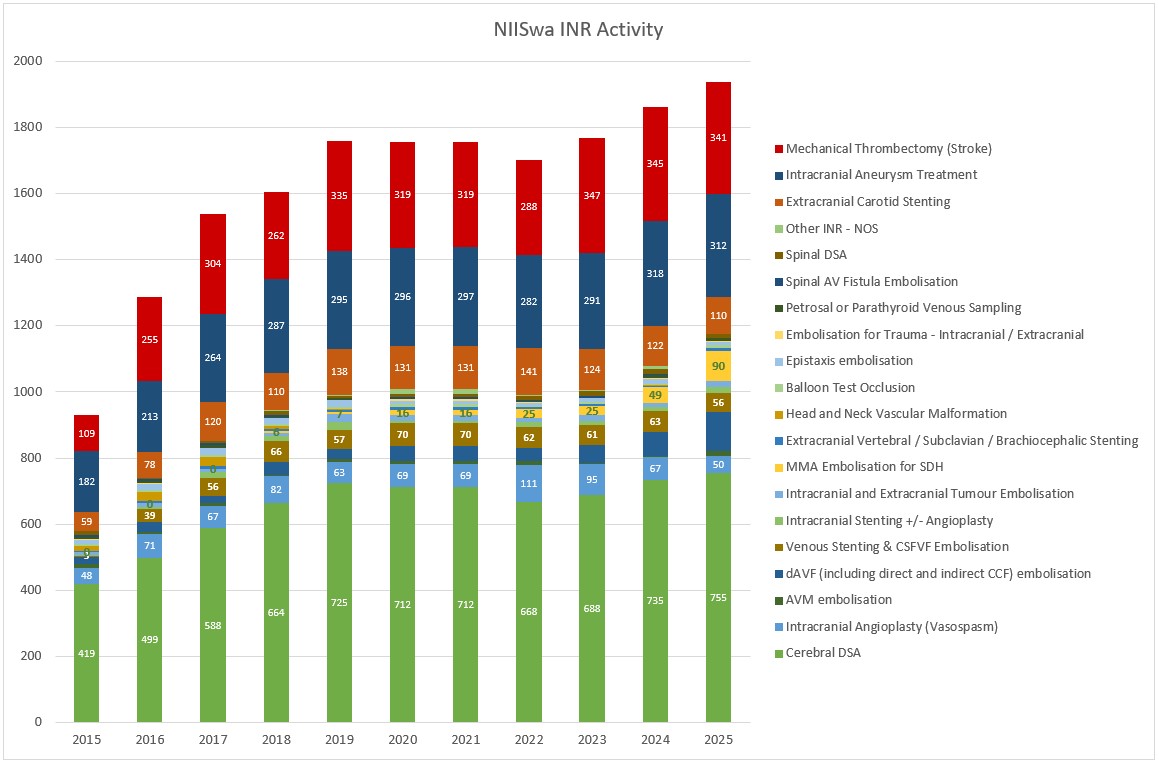Interventional Neuroradiology Fellowships
Interventional Neuroradiology training in WA is governed by the Neurological Intervention and Imaging Service of WA (NIISwa) which is the first specialist Neuroradiology department in Australasia.
NIISwa provides a state-wide service of both tertiary and quaternary Diagnostic and Interventional Neuroradiology. It is headquartered at Sir Charles Gairdner Hospital (NMHS) but services are also provided at all other public tertiary hospitals (Royal Perth Hospital, EMHS, Fiona Stanley Hospital, SMHS and Perth Children’s Hospital, CAHS) with a staff of 11 Neuroradiologists.
The Interventional Neuroradiology Fellowship at NIISwa fulfils the requirements of a Training Service as required by the Conjoint Committee for Recognition of Training in Interventional Neuroradiology (CCINR). One position is offered per calendar year (from January to January).
The Fellowship can be structured as a one- or two- year fellowship based on mutual agreement with consideration on the applicant’s prior experience. It is based at Sir Charles Gairdner Hospital, where the neuroscience services of WA Health are based, however opportunities to be involved in cases at the other hospitals under the state-wide service may be discussed on a case-by-case basis.
 Updated 24th February 2026
Updated 24th February 2026
Consistently over 800 neurointerventional operations per year, excluding catheter angiography, was performed by the service over the last three years. Due to the complete catchment of the Western Australian population, a comprehensive training of all neurointerventional operations can be provided, including aneurysm treatment, stroke intervention, extracranial revascularization (stenting), dural sinus stenting, tumour and epistaxis embolization, vascular malformation assessment and treatment (including AVM and dAVF), endovascular treatment of vasospasm, physiological testing including balloon test occlusion and Wada testing, and paediatric neurointervention.
At NIISwa, clinical care is emphasized. The Fellow is expected to lead an Interventional Neuroradiology team (comprising of a medical registrar, two resident medical officers attached to NIISwa at SCGH as well as medical students attached to the unit and an intern at FSH), under supervision of a consultant, on daily ward rounds, as well as participate in outpatient clinics. Fellow are expected to make decisions facilitating effective utilisation of healthcare resources in the context of individual patient care and advocate for the patient effectively in the context of multidisciplinary management. This occurs daily on ward rounds and inpatient consultations, as well as formal meetings.
Formal MDT meetings of specific interest to our Neurointervention Fellows include:
The prospective Fellow should also recognise the importance of research and actively participate in advancing their knowledge of their specialty. The Fellow is expected to produce at least 1 publication and 2 CME lectures during his/her tenure and will have regular review meetings with supervisors as to progress.
Goals for the Interventional Neuroradiology Fellowship include:
Three Neurodiagnostic Fellows are also within NIISwa. The Neurodiagnostic Fellows are not directly involved in neurointerventional procedures, but are involved in the imaging work up and receive a comprehensive understanding of the role of neurointervention in these cases. The Interventional Neuroradiology Fellow is involved in a 1:4 to 1:5 on-call system with the three Neurodiagnostic Fellows. Close supervision is provided by a Consultant on call.
Please note that the next available start date for the Interventional Neuroradiology Fellowship is February 2027.
Applying for the Interventional Neuroradiology Fellowship
NIISwa Fellowship applications are handled by: This email address is being protected from spambots. You need JavaScript enabled to view it.
If you are interested in the Fellowship, please forward an up-to-date version of your CV and reference letters and contact details for three referees to the above address, along with a covering letter briefly indicating:
1. Your prior experience in diagnostic neuroradiology, general interventional radiology and interventional neuroradiology. 2. Your preferences in regards to training duration with NIISwa. 3. Whether you possess any external funding. 4. Specific career goals once you have completed the Fellowship. 5. If you plan to undertake the Royal Australian and New Zealand College of Radiologists Board Exams as part of your career goals during your tenure in Australia?
We welcome both local and international applicants, however FRANZCR eligibility or equivalent board certification is a requirement.